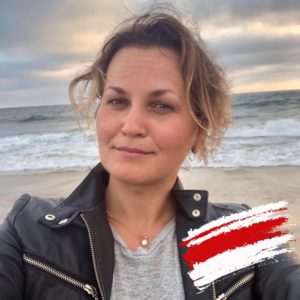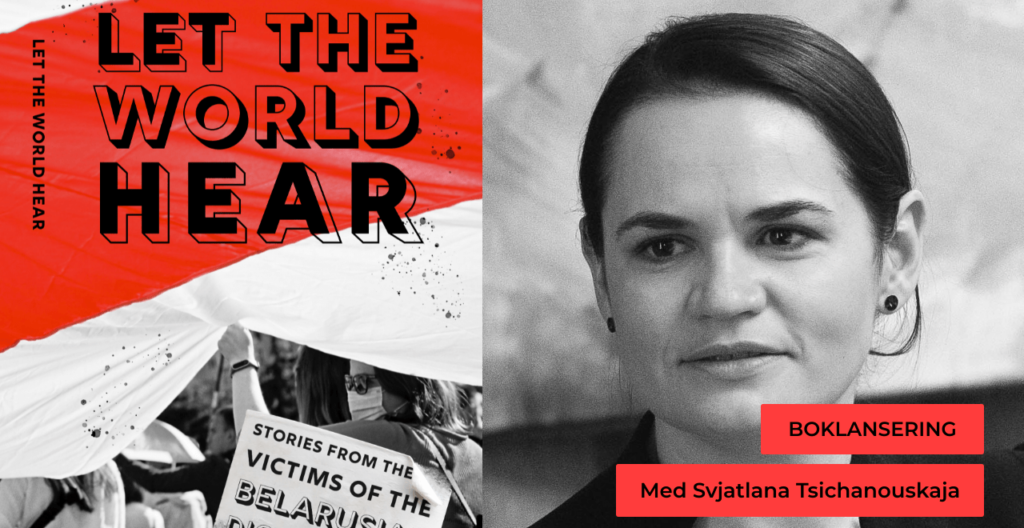Den 9 augusti 2020 utropade sig den belarusiske diktatorn Alyaksandr Lukashenka, som har styrt landet i 26 år, sig till vinnare i ett presidentval ansatt av uppenbart valfusk. Som svar på orättvisan tog folket i Belarus till gator och torg i fredliga demonstrationer. Lukashenkas regim svarade på hemskaste möjliga vis.
Frivärld och Konrad-Adenauer Stiftung Nordic Countries Project kan nu stolt presentera antologin ”Let The World Hear”. Med hjälp av en grupp outtröttliga belarusiska volontärer har vi lyckats samla berättelserna från de som sa ifrån. Antologin innehåller även expertanalyser av Belarus sociala, politiska och ekonomiska situation samt vad det var som föranledde Lukashenkaregimens förbrytelser.
Boklanseringsseminariet gästades av belarusiska oppositionsledaren Svjatlana Tsichanouskaja, Frivärlds Gunnar Hökmark och Katarina Tracz, Gabriele Baumann från Konrad Adenauer Stiftung och antologins redaktör Margareta Barabash.
I lanseringen ingick ett panelsamtal mellan Svjatlana Tsichanouskaja och Moderaternas partiledare Ulf Kristersson om läget och framtiden för demokratin i Belarus.
Se lanseringsseminariet här.
Röster från kapitelförfattare
 Nadzeya Charapan (initiativtagare bakom projektet): The idea with the storytelling project appeared as a reaction to the unbearable distress of injustice, violence, and fraud accompanied by the political crackdown in the aftermath of presidential elections in Belarus in August 2020. For the sake of justice, we wanted to document and share the stories of the people who were brutally detained on August 9-12, 2020. The initiative has been made possible only by the courage of the respondents, who agreed to share their stories despite the existing threat; translators, who worked assiduously during a couple of weeks; and the team of the Stockholm Free World Forum, who generously provided the platform for the project. Lastly, amidst the brutality of the regime, the awakening of the Belarusian nation was occasionally triggered by Sviatlana Tsikhanouskaya, whose role and vibrant transition from a housewife to an international leader is discussed in the analytical chapter.
Nadzeya Charapan (initiativtagare bakom projektet): The idea with the storytelling project appeared as a reaction to the unbearable distress of injustice, violence, and fraud accompanied by the political crackdown in the aftermath of presidential elections in Belarus in August 2020. For the sake of justice, we wanted to document and share the stories of the people who were brutally detained on August 9-12, 2020. The initiative has been made possible only by the courage of the respondents, who agreed to share their stories despite the existing threat; translators, who worked assiduously during a couple of weeks; and the team of the Stockholm Free World Forum, who generously provided the platform for the project. Lastly, amidst the brutality of the regime, the awakening of the Belarusian nation was occasionally triggered by Sviatlana Tsikhanouskaya, whose role and vibrant transition from a housewife to an international leader is discussed in the analytical chapter.
 Vasil Navumau: For me, the 2020 Belarusian protest has been a revelation: I have never thought that such a level of solidarity, persistence and courage was possible in my home country. Since the first protest action I have been a participant of (was it in 2001?), I have been waiting for when the Belarusians as one will raise their voices against authoritarianism. In August it finally happened and has been occurring on an everyday basis for more than 100 days. However, the degree or repressions against the peaceful protest is hardly bearable. Any revolution is a jump into the unknown. I believe that with this Revolution of Consistency we already did the most difficult thing: we made the step forward into the abyss.
Vasil Navumau: For me, the 2020 Belarusian protest has been a revelation: I have never thought that such a level of solidarity, persistence and courage was possible in my home country. Since the first protest action I have been a participant of (was it in 2001?), I have been waiting for when the Belarusians as one will raise their voices against authoritarianism. In August it finally happened and has been occurring on an everyday basis for more than 100 days. However, the degree or repressions against the peaceful protest is hardly bearable. Any revolution is a jump into the unknown. I believe that with this Revolution of Consistency we already did the most difficult thing: we made the step forward into the abyss.

Olga Matveieva: In our chapter I compared two powerful protest waves that swept through two countries – Ukraine and Belarus, seven years apart. These years have been a great challenge for me. Therefore, the analysis of the events in Belarus in 2020 through the prism of reflection on the 2014 Ukrainian Euromaidan was a wonderful opportunity to state my view on these processes from the point of view of both a participant and an observer. We termed the events in Belarus the Revolution of Consistency, which in my opinion reflects the soft and linear movement of the protesters towards emancipation from the repressive regime.
